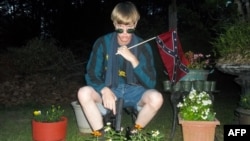On Thursday, a South Carolina judge set a July 11, 2016 start date for the white man accused of killing nine people at an African American church in Charleston last month.
Dylann Roof, 21, will face state murder charges in that trail. But federal authorities are still investigating the killings as a possible act of domestic terrorism, as well as a hate crime.
After more information surfaced about Roof's white supremacist ideology, civil rights activists want the terrorism label to be used.
Cornell Brooks, head of the country's oldest civil rights organization, the NAACP, was one of the first people to call the shooting an act of terror.
"A person can be prejudiced, can be biased, can look down on people of other ethnicities with disfavor, but not allow their bias and bigotry to drive them to the point of violence..." he told VOA. "What's different about this crime in Charleston is this was a crime where the victims were intended to go far beyond the people in that bible study."
What is terrorism?
By the FBI definition, a domestic terror attack must:
- Involve acts dangerous to human life that violate federal or state law
- Appear intended (i) to intimidate or coerce a civilian population; (ii) to influence the policy of a government by intimidation or coercion; or (iii) to affect the conduct of a government by mass destruction, assassination. or kidnapping
- Occur primarily within the territorial jurisdiction of the U.S.
Rights activist Marc Morial of the National Urban League believes the Charleston killings match that definition.
"When I think of terrorism, I think of violence in furtherance of a political ideology. Violence in furtherance of deeply held beliefs that the victims are somehow inferior, substandard, a threat. Versus hate crimes - a hate crime can be an act of terrorism," he said, a week after the church massacre.
Since 2001, right-wing attackers - including white supremacists - have killed 48 people. That's nearly twice the number killed by those with jihadist motives, according to data from the New America Foundation.
The Southern Poverty Law Center tracks active groups, and currently counts 11 among what it terms as "white nationalist" organizations.
But in the 20 years between the bombing of a federal building in Oklahoma City by American Timothy McVeigh and the Charleston shooting, the U.S. "war on terror" focused on the foreign threat. That meant less attention to violent extremists inside the country, says the head of the Alabama-based civil rights watchdog.
"After 9/11, all of the resources of the federal government, you know, started to focus on jihadi terror, and domestic terrorism was ignored," said Richard Cohen, head of the Southern Poverty Law Center. "People stopped talking about it that way. There was a killing last year at a Jewish facility, where a neo-Nazi person who once tried to blow up the Southern Poverty Law Center building - or his followers did- killed three people, and suddenly the government woke back up and said, oh, we've got to devote more resources to domestic terrorism."
As an FBI agent, Michael German, went undercover with white supremacist groups. Now a fellow at New York University’s Brennan Center for Justice, he said the label is less important than how it’s applied.
“Terrorism is always a politically loaded word,” German told VOA. “It's very important that there's consistency with that across the various ideologies because otherwise it looks discriminatory, that violence by minorities is treated more seriously than violence against minorities.”
Label is important
A terror charge wouldn’t mean much for Dylann Roof's prosecution. The 21-year-old already faces the death penalty in the case.
But Richard Cohen warns the white supremacist movement is gaining speed abroad, which is why the words used to describe the Charleston attack are important.
"Sometimes using the terror label has an impact on our public policy, makes us realize that different phenomenon share similar characteristics," he said.
The SPLC did some online sleuthing, and Cohen said they found posts by Roof in a web forum in which he talks about the Greek neo-Fascist party, Golden Dawn — adding to the anti-black rhetoric found on a website registered to his name.
There is no allegiance to a country. Instead, in Cohen's assessment, "what they have allegiance to is their race."
"They see a kinship with white people worldwide."
But for Cornell Brooks of the NAACP, the Charleston shooting may have intended to terrorize a community, but ultimately failed.
"We have the entire country coming together, wrapping their arms around these victims, around the families of these victims. If it was his purpose to in any way start a race war, he was successful in this respect - he started a renewed war against racism."




